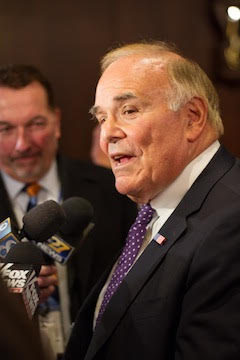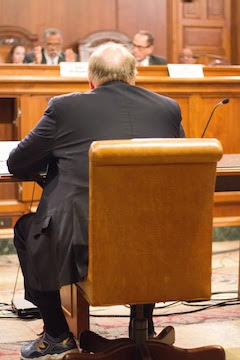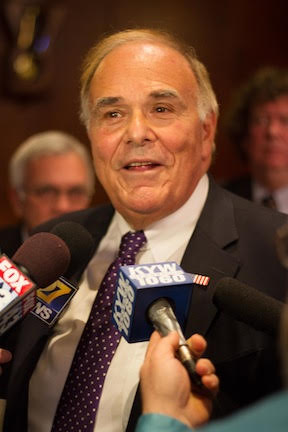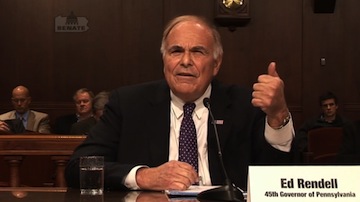Rendell: “If your main complaint is the way she’s conducted herself in office, impeach her. Don’t use this method.”
Sen. Scarnati’s Direct Address Removal Committee members are rather like kids who’ve found a locked gun cabinet, but who have no idea why the gun was put there, and how, or why it should be used. But the kids still want to take the gun out and fire it.
Former Gov. Ed Rendell took a masterful and commanding turn Tuesday, January 12, before the state Senate committee considering the “Direct Address” removal of Attorney General Kathleen Kane.
A former Philadelphia DA and mayor, Rendell demonstrated why experience matters, and why it’s important to have someone like him around.
Rendell suggested to the senators on the committee that a careful politician, like a good lawyer, or businessman, seeks to minimize risk and unpredictability, not increase them.
The unknowns of the wild and obscure Direct Address removal procedure that the Senate is contemplating against Kane are risky and unpredictable, and could end up biting the senators and the commonwealth on the behind, Rendell warned.
On the surface, Rendell spoke on whether an attorney general like Kane must have a law license to perform her job.
Beneath the surface, Rendell spoke on something much more significant: the importance of looking before one leaps, and crafting sound public policy.
Rendell testified that 95 to 98 percent of his job as DA involved policy or administrative duties requiring sound judgment and common sense, not a law license.
Often common sense and sound judgment dictated restraint in uncertain or antiquated legal issues, Rendell said.
Rendell’s deeper, subtler message was this: just because a law is on the books doesn’t mean that it should be enforced. And just because you can do something, doesn’t mean that you should.
That’s where the policy experience of a cautious and careful prosecutor or an elected official comes into play, Rendell told the senators.
Rendell used stories from his long career as a prosecutor and a successful politician to make his point. In so doing, he illuminated decades of Pennsylvania political history.
“I’m not here to support (AG Kane’s) position per se,” Rendell began by telling the committee. “I’m here to talk about the legal issue, because I think it’s an important legal issue. And I would advise the committee and the Senate not to remove her based on a suspended license.”
Rendell, who turned 72 last week, explained his latest role as Pennsylvania’s most experienced, and perhaps most successful, senior politician.
“I’ve said to myself, as long as I have the capacity to do so, I’m going to try to weigh in on issues of public concern,” he said. “I do so on legislation, I do so on administrative issues in Harrisburg, and I’m here because this is an issue that concerns me, and I really deeply believe that this [Direct Address removal of AG Kane] is not the proper way to go. There are other, better avenues to pursue.”
Rendell provided stories from his long public career to illustrate his subtle point.
He served as elected district attorney of Philadelphia County for eight years, from 1978 to 1986, including through the tulmutuous MOVE years. Before his election as DA, Rendell interned in the DA’s office, and worked as an assistant DA, including a stint running the homicide division.

The TV guys love Ed Rendell. Here WHTM’s Dennis Owens relishes quotes from an articulate, colorful Rendell
“I served for nine years as an assistant (DA) under Arlen Specter, and Arlen Specter interestingly never overruled my judgment on any decision I made as chief of homicide,” Rendell recounted with a thoughtful pause. “Interesting. I don’t know if any of you ever worked for Arlen Specter, but that’s saying a lot.”
Among his most important non-legal responsibilities as DA, he said, were communications duties with the public and the Philadelphia city council. Rendell explained that each year he would go before city council to make his budget request.
“After city council would rule, I would take my appeal to the mayor,” Rendell said with a smile. “Mayor (Frank) Rizzo was mayor for my first two years as district attorney and, if council had turned my request down, I would go to see Mayor Rizzo, and I would tell him, ‘Mayor, it’s a war out there!’ and he would pound the desk and I would get everything that I wanted. Nowhere in those budgetary discussions was it necessary for me to be a lawyer. It was necessary for me to have the sense, and the policy making ability, that I did have as mayor and governor.”
The job of an experienced prosecutor and public official often is to know what not to do, and what laws on the books not to enforce, Rendell told the Senate committee.
“When I became district attorney there was a law on the books called ‘sodomy,'” Rendell recalled. “The legislature — I don’t know if any of you voted to repeal that law, but you eventually did repeal the sodomy law — and sodomy in those days would be committed by two adults who were doing what were called ‘unnatural sex acts,’ and they were guilty of sodomy. That would include people having lesbian and gay sex. Because the law was on the books, the police would arrest those people, if they saw them doing it. I decided that wasn’t a good use of police time. I decided that as long as it was consenting adults, there was no governmental policy that justified the allocation of resources. I made that decision not as a lawyer but as a policy maker. That was about 98 percent of my job.”
“What I’m saying is there are some decisions that are mixtures between legal decisions and policy decisions, but 97 percent of the work of a prosecutor in a major office inherently has to be administration, policy, communications and outreach. At least 97 percent. I think that’s the case with an office as big as the attorney general’s office in Pennsylvania.”
Joining lawsuits, filing amicus briefs, and even approving wiretap requests were all policy decisions requiring careful forethought, and not a law license, Rendell explained.
Rendell said he once refused a police request to put a listening device in the mayor’s office when an unnamed mayor was accused of running a sports betting pool.
“You don’t put a wiretap in the mayor’s office for running a sports betting pool,” Rendell scoffed.
These policy decisions require not only experience, but also common sense and forethought, he told the senators.
Just because a law is on the books doesn’t mean it should be enforced, Rendell explained. An experienced politician or public official knows there are broader concerns and ramifications at play than statutes on paper.

Ed’s feet have been bothering him, so he wore New Balance sneakers to the Senate hearing. ‘Maybe Ed was tweaking the senators a little,’ someone says.
For another example, he said, several DAs around the state recently joined a lawsuit challenging Gov. Tom Wolf’s moratorium on the death penalty. Even though a DA could do such a thing, Rendell explained, it doesn’t mean that he should. If he was still a district attorney, Rendell said, he would counsel the other DAs not to file such a court challenge until the governor’s commission on the death penalty had a chance to issue its report, so that the DAs could at least examine the data and statistics showing how the death penalty was applied around the state.
The best, most experienced DAs, Rendell added, “make decisions all the time based on policy. Yes, there’s evidence against Mary Smith, but it’s not significant enough for us to prosecute, to waste our court time prosecuting, we’ll put her in the ARD program, or we’ll just drop charges.”
Alluding to the constitution’s archaic Direct Address removal provision now before them, the responsible thing to do is to look before one leaps, and not act precipitously, angrily, carelessly, or imprudently, Rendell offered.
Just because an old provision is on the books doesn’t mean it should be applied, Rendell counseled. And just because you can do something, doesn’t mean that you should.
Whether this message was lost on the relatively inexperienced Senate committee members was another matter.
Senate President Pro Tem Joe Scarnati, who has appointed himself an ex officio member of the Direct Address committee and its swing vote, angrily challenged the former governor, mayor and prosecutor.
But Sen. Scarnati only came across as a careless hothead, and out of his depth, when questioning Rendell.
“The biggest decisions,” Rendell told Sen. Scarnati, “were policy decisions. Like, for example, starting a police brutality unit. You have no idea how difficult a decision that was, back in 1978 in Philadelphia.”
“But on these big issues …” Scarnati broke in.
“That’s as big as it got,” Rendell told Scarnati.
Scarnati carelessly attempted to use the 1985 Philadelphia MOVE firebombing incident against Rendell.
“I made the decision to defer to the federal prosecutor,” Rendell told Scarnati. “That wasn’t a legal decision. That was a policy decision.”
“Well I’m confused,” Scarnati said. “Your quote in the Philly paper of September 20, 1991, was, ‘I made that decision in two weeks.'”
“Right, I made it. But not necessarily as a lawyer,” Rendell says.
“You didn’t make it as a lawyer, to not investigate bombings, fires, shootouts, and deaths?” Scarnati yelled dramatically.
“I made the decision,” Rendell explains, “that given our relationship with the police at the time, and given the fact that the federal attorney had said that they were willing to investigate, that from a policy mater, rather than having us and the police going at each other at that level, that the federal attorney would go ahead and do that investigation.”
“Would you be comfortable with a non-attorney, a non-licensed attorney making that decision?” Scarnati yelled at Rendell.
Scarnati, apparently, has never met a shyster he doesn’t like; he erroneously imagines that all sorts of wisdom is imparted with a law license.
Scarnati asked, “Is the public served with decisions such as this, had you not been an attorney? You said you made that decision. And you did not make that one bit on the fact of your legal background? You made it purely on a public relations background?”
Here Senate President Scarnati tipped his hand: Scarnati amazingly confuses sound public policy with “public relations.”
This could explain why there is very little sound public policy coming out of the state Senate with Sen. Scarnati in a leadership position, and only shallow PR.
“It’s a policy decision,” Rendell again attempted to explain to Scarnati. “Given the relationship between the Philadelphia police, and the district attorney’s office at that time, I made the decision that we’re better off — and given the fact that the United States attorney was going to investigate — I made the decision that it was better for the administration of justice in Philadelphia County, that the US attorney do it, not the district attorney.”
Rendell told the committee, “Let me say this: I know this is a controversial subject. I care very much about the conduct of public officials, and law enforcement officials. I was a law enforcement official for eighteen years of my life. I was a public official for sixteen years of my life. I care very deeply about the reputation (of public officials) . There’s been a lot of roads gone down here and, if you believe that the attorney general’s conduct was egregious, the proper remedy is not this one. Because this one is clouded and it’s not gonna ever be clear. It hasn’t been used for a hundred years: the proper remedy is impeachment.
“And I would urge you to step back, and begin the impeachment process, where all of this can be heard. But to remove her on this issue, where I think she probably has the right side of the argument, that she can continue to function, and do her job, and that citizens of Pennsylvania wouldn’t suffer, I think would be the wrong thing to do.”
“Your complaint against Kathleen Kane isn’t that she has a suspended law license,” Rendell told the committee. “Your complaint is her conduct.”
Senator Lisa Baker asked Rendell, “You’ve established, and I’ve listened to you say, that much of the duties and functions both in the office of attorney general and a district attorney’s office are administrative. But the law requires the district attorney to be admitted before the Supreme Court. The law requires, and the constitution requires that the attorney general be a lawyer. So are you recommending to us today that both of these offices don’t need lawyers to run them?”
“I apologize if I didn’t say it precisely enough, but, no,” Rendell said. “I’m here to answer the very narrow question: Does an attorney who’s had a license suspended have the power to remain as the head elected official of an office?”
Rendell asked the senators if they realized that U.S. Supreme Court justices aren’t required to be lawyers, let alone to hold a state law license.
“The rules for suspended lawyers are pretty clear,” Sen. Baker went on. “You have been pretty clear today in saying that you believe impeachment is the appropriate mechanism to address this situation. Do you believe the Senate has the authority to act under the reasonable [Direct Address] clause? To conduct on its own? Do you believe we are doing something that’s proper and in the purview and jurisdiction of the Senate to act?”
This has been a central and recurring question posed by senators in their committee hearings the last few weeks.
Scarnati’s committee members are rather like kids who’ve found a locked gun cabinet, but who have no idea why the gun was put there, and how, or why, it should be used. But the kids still want to take the gun out and fire it.
Rendell told them that just because they can do it, doesn’t mean that they should do it.
This separated the experienced Rendell from the politically inexperienced and untempered committee members. It separated the man from the boys, and girls. Rendell, in a word, outclassed them.
“I haven’t given it much thought,” Rendell told Baker. “But I probably believe you have the purview and ability to act; I’m just urging you to not act.”
“I think we’re in a very difficult position because the attorney general as you know has sought reinstatement of her license from the Supreme Court,” Rendell told the committee. He challenged them to think of the repercussions and consequences before they acted.
“There now is almost an entirely new Supreme Court from the one that suspended her” Rendell said. “What would happen if this committee recommended that she be removed on this issue, the Senate as a whole voted, and voted to remove her, and then a week later the Supreme Court decided that they were going to reinstate her license? Does her license get reinstated automatically? Do we have to come back to the Senate for action? How do you frame your decision? Are you removing her for as long as her license remains suspended? It’s a very difficult question because she’s going before a new court with at least three judges who’ve never heard this issue before. I would urge you not to take action at all, but certainly not to take action until the Supreme Court has ruled on her request.
“I have no clue what the Supreme Court is going to do, but there’s a chance in four or five weeks she’s going to be reinstated. And then, what would happen then?
“It would be chaotic. And again, would you frame your order, ‘As long as she has a suspended license Kathleen Kane can no longer serve as attorney general,’ so that if the court reinstates her license she becomes attorney general again? I don’t know what you’d do. And then you’d have the Senate throwing her out, and the Supreme Court reinstating her license — what would the law be on that? Who would decide what happens next? It would add to the chaos.
“Guys, senators, impeach her. If your main complaint is the way she’s conducted herself in office, impeach her. Don’t use this method.”
Editor’s note: you can watch Ed Rendell’s masterful testimony before the Senate committee here>.





While I think Scarnati got the better of Rendell in the exchange on the firebombing in Philadelphia, Rendell is right to a large extent.
The House is moving toward impeaching Kane based on the loss of her license. She would likely get convicted in the Senate. Why not move in that direction?
I think if fast Eddie is your defense, you got big problems.
Wow, great article. Really points out the inexperience/ineptness of this Senate panel.
Not being biased is your description of Rendell in glowing terms. I prefer independent writers that can see the damage done by the last 3 governors of Pa.
EDITOR: You would be hard pressed to fin a historian / columnist more outspoken about the corruption in state government than Bill Keisling. This is as applicable to Democrats and Republicans. We invite you to check out wwww.Yardbird.com
Who on earth would look to Ed Rendell to figure out the right thing to do?
Common sense and good judgement….hmmmm…lost Kane right there!
Seems to me the only one who is right and moral in the entire situation is MS. Kane.